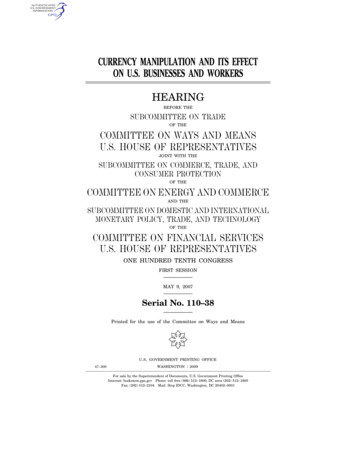
Transcription
E U R O P E A N D T H E T R A N S AT L A N T I C R E L AT I O N S H I PThe Modern Rootsof the Graveyardfor DiplomatsThe Tripartite Conferenceon Cyprus in 1955Erika ManouselisPA P E RO CTO B E R 2020
Project on Europe and the Transatlantic RelationshipBelfer Center for Science and International AffairsHarvard Kennedy School79 JFK StreetCambridge, MA 02138www.belfercenter.org/TransatlanticStatements and views expressed in this report are solely those of the author and do not implyendorsement by Harvard University, Harvard Kennedy School, or the Belfer Center for Scienceand International Affairs.Design and layout by Andrew FaciniCopyright 2020, President and Fellows of Harvard CollegePrinted in the United States of America
E U R O P E A N D T H E T R A N S AT L A N T I C R E L AT I O N S H I PThe Modern Rootsof the Graveyardfor DiplomatsThe Tripartite Conferenceon Cyprus in 1955Erika ManouselisPA P E RO CTO B E R 2020
AcknowledgmentsI would like to express my gratitude to my team at the Project on Europeand the Transatlantic Relationship for their support and guidance: Nicholas Burns, Cathryn Clüver Ashbrook, Alison Hillegeist, and Torrey Taussig.I would also like to thank Mina Mitreva, Amanda Sloat, Jolyon Howorth,Morgan Kaplan for providing feedback on initial drafts. Special thanks toAndrew Facini for helping with the finishing touches.Belfer Center for Science and International Affairs Harvard Kennedy Schooliii
Table of ContentsIntroduction. 1The United Nations General Assembly Debate .4Plan B . 7The Three Positions . 13The British Proposal and Conference Aftermath. 17Conclusion.22Belfer Center for Science and International Affairs Harvard Kennedy Schoolv
A watchtower in the United Nations Peacekeeping Force in Cyprus' bufferzone in Nicosia, July 2019.Photo by Author
IntroductionFor nearly 60 years, attempts at finding a lasting political solutionto the conflict in Cyprus have created an environment known as the“graveyard of diplomats” for practitioners of international relations.1Hastily constructed by the British Royal Air Force in December 1963because of intercommunal fighting between Greek Cypriots and Turkish Cypriots, a demilitarized buffer zone, or “Green Line,” partitionedthe two communities and has separated the island and its inhabitants ever since. Now, Cyprus hosts an amalgamation of differentpowers: two British sovereign bases which cover 98 square miles, the“Green Line” patrolled by the United Nations Peacekeeping Forcein Cyprus (UNFICYP) spanning 134 square miles, a de facto stateonly recognized by Turkey called the “Turkish Republic of NorthernCyprus” (TRNC) occupying one-third of the island, and the Republicof Cyprus which has de jure sovereignty over the entire island but islocated in the southern two-thirds.Mainstream analysis of the contemporary Cyprus conflict in newspapers and policy briefs have a historical narrative beginning in 1959 atthe creation of the Republic of Cyprus with the Zurich Accords whichgranted independence to the former British colony in exchange formilitary bases. This narrative tracks how the fledging country quicklydevolved into unsolvable ethnic turmoil. In this view, the competing objectives of Greek Cypriots and Turkish Cypriots for enosis andtaksim respectively is the root of the Cyprus issue and the main reasonwhy the two communities could not peacefully live together.2 That thisconflict is now so widely viewed through this lens alone is malpracticeof diplomatic history because the independence of Cyprus, i.e. the1The international solution to this conflict revolves around a “settlement based on a bicommunal,bizonal federation with political equality,” see “Resolution 2483 (2019),” United Nations SecurityCouncil, S/RES/2483 (2019), July 25, 2019, BFCF9B-6D27-4E9C-8CD3-CF6E4FF96FF9%7D/s res 2483.pdf. The vision is for a federation (combining multiple semi-autonomous areas into one government) consisting of two zones separatedinto the two communities (Greek Cypriot and Turkish Cypriot) under regional administration.2Enosis is the Greek word for “union” and seeks the political union of Cyprus and Greece. Taksim is theTurkish word for “division” or “partition” and seeks the partition of the island of Cyprus into Turkishand Greek portions. For an example of this narrative see Vincent L. Morelli, “Cyprus: ReunificationProving Elusive” (Congressional Research Service, 2019) https://fas.org/sgp/crs/row/R41136.pdfBelfer Center for Science and International Affairs Harvard Kennedy School1
signing of the Zurich Accords, is intricately tied to the post-war reorderingof international politics and the British Empire.Any attempt to understand one of the most intractable problems ininternational relations today must take its decolonization into account.The contemporary Cyprus conflict began at the Tripartite Conferenceon the Eastern Mediterranean and Cyprus held by the governments ofthe United Kingdom, Greece and Turkey in London from August 29 toSeptember 7, 1955. It is the moment that internationalized an otherwisecolonial problem. However, most international relations historianswriting about Cyprus during the 1950s have glazed over the TripartiteConference, deeming it a relatively insignificant affair which achieved littleof note.3 Some briefly touch upon it with a widely accepted view that itsmain contribution was to legitimize Turkey’s participation on questionsconcerning the island.4 Similarly, historians of the British Empire duringthis period of decolonization have little interest in Cyprus at all.5How to give enough representation to Cypriots to be acceptable to international public opinion while still preserving control over the territory wasthe central puzzle facing British policymakers in the 1950s. This problemwas not unique to the Crown Colony of Cyprus; the British faced similarconundrums in India, Palestine, Kenya, Nigeria and Malaya for example.But, the particular makeup of the island’s population combined with itsgeostrategic location in the Eastern Mediterranean made the difference.Maintaining sovereignty over Cyprus was inseparable from an existential question about British supremacy in the Middle East, but the colony’ssubjects were Europeans; therefore, lack of government representation for23Mohammad F. Mirbagheri, Cyprus and International Peacemaking (New York: Routledge, 1998) begins theCyprus problems at the Zurich Accords in 1959. He glosses over the Tripartite Conference stating that it didlittle to achieve a solution. Cemal Yorgancıoğlu and Şevki Kıralp, “Turco-British Relations, Cold War and Reshaping the Middle East: Egypt, Greece and Cyprus (1954-1958),” Middle Eastern Studies 55, no. 6 (2019):914-31 characterize the talks as producing “no fruitful outcome.”4Adel Safty, The Cyprus Question: Diplomacy and International Law (Bloomington, IN: iUniverse, 2011) outlines the official proceedings of the conference but maintains that its significance was to only to concedethat Greece and Turkey had legitimate interests in the British colony. Andrekos Varnava, “ReinterpretingMacmillan’s Cyprus Policy, 1957-1960,” Cyprus Review 22, no. 1 (2010): pp. 79-108, /cr/article/view/183 writes two sentences on the conference and sees itsimpact as validating Turkey’s position.5Simon Smith, Ending Empire in the Middle East: Britain, the United States and Post-war Decolonization,1945-1973 (Oxford: Routledge, 2012) describes the post-WWII reshuffling of global power in the MiddleEast and the relationship between the U.S. and the UK. It challenges the assumption of the ‘special relationship’ that the two countries were often working in tandem; instead, Smith writes that the UK robustlydefended its interests in the region. It does not mention Cyprus.The Modern Roots of the Graveyard for Diplomats: The Tripartite Conference on Cyprus in 1955
European peoples made the British look bad.6 Moreover, the inhabitantswere compatriots of important allies in the region, Greece and Turkey, sothis issue threatened key military alliances in the West.Analyzing Harold Macmillan’s diplomatic navigation as Foreign Secretaryin Prime Minister Anthony Eden’s Cabinet (April–December 1955) andthe UK government’s decision-making around the Cyprus question andTripartite Conference sheds new light on the history of the conflict. Facedwith the pressure to defend vital national security interests in the MiddleEast, manage the relationship with the United States as a rising power, staveoff decolonization of the quickly dwindling British Empire, and participatein the two new major norms-binding international multilateral institutions(the North Atlantic Treaty Organization and the United Nations), Macmillan maneuvered to find a resolution to Britain’s political problems causedby this vexing Mediterranean colony.7Macmillan called the conference to appear to be finding a solution and togrant some measure of self-government to Cypriots with the full intentionof retaining sovereignty for the foreseeable future. As his maneuveringdemonstrates, Macmillan employed “divide and rule” tactics betweenGreece and Turkey to create a deadlock and encourage the narrative indomestic and international public opinion that the issue was primarily anethnic one. Macmillan preserved British interests by forming a consensusaround the UK’s position that Cyprus was a critical lynchpin for Britishnational security and that the colony would be granted a more representative government at some undefined later date. He managed to influenceinternational public opinion and obtain U.S. support in the short-term,but in the long-term, this internal division along ethnic and national linessowed the seeds for discontent and future violence in Cyprus as it did in inother parts of the British Empire. These are the modern roots of the present“graveyard for diplomats.”6This is something Harold Macmillan himself admitted, “Mediterranean peoples could not be refused anykind of self-government, as if they were primitive savages.” This statement betrays a regrettable view thatit was more “acceptable” to subjugate non-European peoples. Peter Catterall, ed., “4 September, 1955” inThe Macmillan Diaries: The Cabinet Years, 1950-1957, vol. 1 (London: Macmillan, 2003), 469.7Robert Holland, Britain and the Revolt in Cyprus, 1954-1959 (Oxford: Clarendon Press, 1998) details theconference, surrounding events, and Macmillan’s role closely. Holland describes Macmillan’s key objectivesas neutralizing the threat of self-determination for the island and saving face at the UN (page 73). But hedoes not include Macmillan’s diaries as a source, and this provides further context for how he made hisdecisions as Foreign Secretary.Belfer Center for Science and International Affairs Harvard Kennedy School3
The United Nations GeneralAssembly DebateWith the impending post-war collapse of their empire in Asia, the Britishwere determined to safeguard their interests in their traditional sphere ofinfluence, the Middle East. While they were ready to make concessions inother colonies, Cyprus, along with Gibraltar, Aden, Seychelles, the Falklands, Bermuda, Hong Kong, and Malta, were deemed either “too smallor too important strategically ever to become independent self-governingunits.”8 Issues with Egyptian President Gamal Abdel Nasser lead to therelocation of the British Middle East Command headquarters from Egyptto Cyprus in December 1954 thereby cementing the importance of theterritory in UK’s foreign policy strategy.9 Because of this, Colonial Minister, Henry Hopkinson, famously declared in the House of Commons thatCyprus could “never expect to be fully independent.”10Therefore, in a conversation with Greek Prime Minister Alexandros Papagos, Eden told his counterpart that “Cyprus was not discussable.”11 Thisprompted the Greek government to seek resolution through the UnitedNations, since the highest level of bilateral diplomatic talks had failed toproduce any results.12 Citing British intransigence over granting Cypriotindependence, the Greek government requested the following item beplaced on the United Nations General Assembly agenda for the 9th sessionin September 1954: “Application, under the auspices of the United Nations,of the principle of equal rights and self-determination of peoples in thecase of the population of the island of Cyprus.”13 The Greek government48“The Constitutional Future of the British Empire,” Eastwood to JM Martin, United Kingdom National Archives PREM 4/42/9, September 1, 1941.9There were two types of British Empire in the Middle East: a formal dependent empire made up of theMandate of Palestine and Transjordan, the Somaliland Protectorate, the Crown Colony of Aden, and theCrown Colonies of Cyprus and Malta and an informal empire of treaty relations with the Arab states, particularly Egypt and Iraq. These were managed by the Colonial Office and the Foreign Office respectively.See William Roger Louis, Imperialism at Bay: The United States and the Decolonization of the British Empire1941-1945 (New York: Oxford University Press, 1978) and Simon C. Smith, Ending Empire in the Middle East:Britain, the United States and Post-War Decolonization, 1945-1973 (London: Routledge, 2013).10“Cyprus (Constitutional Arrangements),” Commons and Lords Hansard (UK Parliament, July 28, nts11“14 June, 1955,” The Macmillan Diaries, 436.12Holland, Britain and the Revolt in Cyprus, 1954-1959, 31-33. Holland describes this conversation betweenthe Prime Ministers as “the beginning of the end” of the traditional Anglo-Hellenic friendship.13“Chapter VII: The Cyprus Question,” 1954 Yearbook of the United Nations (United Nations), accessed May10, 2020, 94-96, ge.jsp?volume 1954The Modern Roots of the Graveyard for Diplomats: The Tripartite Conference on Cyprus in 1955
argued that lack of political development for Cypriots created resentmentwhich threatened wider political stability in the Eastern Mediterranean.14At this point, the issue was still a colonial one.The General Assembly voted to inscribe the item onto the agenda inSeptember despite the UK’s petition to the United States Department ofState to prevent it from happening.15 Although the State Department hadcommunicated to the Greek government that “no useful purpose wouldbe served, and in fact serious harm would be caused to Western interests,by the introduction of this controversial subject in the General Assembly,” the U.S. abstained from action because it “recognize[d] that Cyprusis of strategic importance to the United States but [was] unable to confirm that United States strategic interests require that there be no changein sovereignty over Cyprus.”16 The U.S.’s Aide-Mémoire to the BritishEmbassy forecasted that should this issue arise on the international stage,“the United States Government would be confronted with the problem ofreconciling general political considerations with the importance which itattaches to the principle of the self-determination of peoples.”17 This was ahistorical point of tension between the two governments and by no meansconfined to the Cyprus case.18When the Cyprus question was brought for discussion before the UnitedNations’ First Committee, a Greek draft resolution aimed to have theAssembly recognize the right of self-determination in Cyprus.19 The UKdelegation argued that the matter was under British domestic jurisdiction,14See Stephen G. Xydis, “The UN General Assembly as an Instrument of Greek Policy: Cyprus, 1954-58,” TheJournal of Conflict Resolution, Vol. 12, No. 2 (June 1968), 141-158, https://www.jstor.org/stable/17269315“Memorandum of Conversation, by the Deputy Director of the Office of Greek, Turkish, and Iranian Affairs,”by William O. Baxter, State Department 747C.00/2–85, February 8, 1954. 1952-54v08/d36116“Department of State to the British Embassy, Aide-Mémoire,” by Maxwell M. Hamilton and William O.Baxter, State Department 747C.00/1–2854, July 12, 1954. 1952-54v08/d37317Ibid.18When Stalin, Roosevelt and Churchill met at Yalta to reconfigure the new international order at the end ofthe Second World War, the latter exploded in an undiplomatic fit of rage while discussing trusteeships anddependent areas: “I will not have one scrap of British territory flung into that area. After we have done ourbest to fight in this war and have done no crime to anyone, I will have no suggestion that the British Empireis to be put into the dock and examined by everybody to see whether it is up to their standard,” “Congressional Record: 81st Congress, First Session,” Vol 95, Part 7, United States Senate (1948), 9092-9093. https://books.google.com/books?id 2z6J9m8uq3IC&pg PA9092#v onepage&q&f false19Ecuador, Syria, El Salvador, Poland, Indonesia, Czechoslovakia, the Philippines, the Soviet Union and Yemenexpressed their agreement with Greece during the debate.Belfer Center for Science and International Affairs Harvard Kennedy School5
pointing to Article 2, paragraph 7 of the UN Charter, and that Greece’sappeal to principle of self-determination was a guise to obtain sovereigntyover the island. Self-determination equated to enosis because if given achance to self-identify, the majority of Cypriots would choose to unite withGreece. This set a terrible precedent, the UK delegation claimed.20Moreover, the delegation pointed out that they were committed to theideals of the UN Charter; and yet, because of “tremendous defence obligations” and the withdrawal of British forces from the Suez Canal Zone,the UK could not concede independence or self-determination to Cyprus.Underlining the importance of the island in the UK’s grand strategy, therepresentative stated, “the fate of the United Kingdom and of the democratic world might well hang on Cyprus, which was a vitally important linkin the chain of defence of freedom.”21The debate ended when the delegations of El Salvador and Colombia submitted an amendment to the draft resolution which postponed a decision.Though the diplomatic wrangling ended civilly at the UN, the failure toact on Cypriot autonomy led to anti-British and anti-American rioting inGreece and intensified resistance to British rule: “In Athens 59 personswere reported injured when 5,000 demonstrators surrounded buildingshousing United States In Salonika Greek rioters publicly burned Britishand American flags, smashed windows in the United States and BritishConsulates.”22 In addition to this rioting, Georgios Grivas formed a guerillaorganization, EOKA, to oppose British rule on the island through violence.620“Agenda Item 62,” General Assembly First Committee, United Nations A/C.1/SR.752, December 15, 1954,https://undocs.org/pdf?symbol en/A/C.1/SR.75221Ibid.22“Congressional Record: 84th Congress, Second Session,” Vol 102, Part 4, United States Senate (1956),4545-4546, https://books.google.com/books?id wLNSQj6krQgC&pg PA4545#v onepage&q&f falseThe Modern Roots of the Graveyard for Diplomats: The Tripartite Conference on Cyprus in 1955
Plan BWhen Macmillan was appointed Foreign Minister in April 1955, the situation in Cyprus was dire. Facing violent attacks from EOKA and adverseinternational public opinion, the British government was forced to reevaluate its position on the island. Macmillan wrote in his journal: “Very badnews from Cyprus. In spite of the confidence of the Governor and theColonial Office that there would be no trouble, there have been seriousbomb outrages, involving the destruction of the new wireless station,([which] has cost HMG an immense sum).”23 Beginning in June 1955,he worked closely with Colonial Secretary, Alan Lennox-Boyd, to figureout a solution to the Cyprus problem which safeguarded British security interests, quelled an increasingly hostile local population entrenchedin guerrilla warfare, was acceptable to both the Greek and Turkishgovernments, and satisfied public opinion both within the UK among Conservative voters and among the international community at the UN.The British Ambassador to the United States similarly urged action following the events at the United Nations and asserted that the Greekgovernment inscribed Cyprus onto the General Assembly agenda toappeal to American audiences. He urged Prime Minister Anthony Eden tochange the status quo because Americans regarded it as unsustainable. Heexplained how the UK’s present position in their colony would eventuallylead to friction with the rising power, “if British rule in Cyprus is able tomaintain itself only by failing to provide an outlet for the political aspirations of the local people, we are always going to have to fight hard—andnot always successfully—for the United States support.”24 Arguments forproviding a modicum of self-government to the colonial population ofCyprus were mounting. Nevertheless, the UK government worried that ifgranted a political voice, the vast majority of Greek Cypriots, backed by theGreek Orthodox Church, would agitate for enosis and transfer sovereigntyover the island to Greece.23“3 April, 1955,” The Macmillan Diaries, 410.24“American Attitude Towards the Cyprus Question,” by Sir Roger Makins to Sir Anthony Eden, United Kingdom National Archives, RG 1081/48, January 12, 1955.Belfer Center for Science and International Affairs Harvard Kennedy School7
Then Macmillan had an idea: “start by asking the Greeks and the Turksto talk it over with us. If the Greeks refuse, their position in [the UnitedNations] will be correspondingly injured.”25 Clearly, the 1954 GeneralAssembly debate was fresh in his mind. As historians have noted, theinvolvement of Turkey as an equal partner in these talks legitimized thecountry’s claims to the future of island. But this was a careful calculation onMacmillan’s part. During the 1954 General Assembly debate over Cyprus,Turkish policy was to avoid souring relations with Greece. The Turkishdelegation was contented to let the British deal with the enosis question intheir colony on their own.26 However, when he assumed control of the Foreign Office, Macmillan sought to bring Turkey to the center of the Cyprusquestion. This was part of his strategy to use international leverage to solvethe problem rather than allow the Colonial Office to manage the colony’sdomestic politics.27 This approach brought international dynamics betweencountries to play out a Cypriot stage with bloody consequences for itsinhabitants.Therefore, when Eden announced to the House of Commons that they hadinvited the Greek and Turkish Governments to the conference, he statedthat “strategic and other problems” in the Eastern Mediterranean are affecting the United Kingdom, Greece and Turkey alike.28 When pressed byLabour Members of Parliament about whether the Cypriot people will beincluded or at least consulted to ensure that their interests would be takeninto consideration, the Prime Minister responded that he preferred to dealwith the “international aspect” of the problem first instead of involvingrepresentatives of the Turkish Cypriot and Greek Cypriot communitieswhich have empowered them in their efforts towards self-government. Historian Robert Holland argues that “only by excluding [Greek Cypriot andTurkish Cypriots] could the internal complexion of the island be subordinated to the international and regional factors which Macmillan was benton exploiting.”29825“9 June, 1955” in The Macmillan Diaries, 434.26Holland, Britain and the Revolt in Cyprus, 1954-1959, 43-45.27Ibid, 58-61.28“Eastern Mediterranean (Invitation to Greece and Turkey),” Commons and Lords Hansard (UK Parliament,June 30, 1955), 5CV0543P0 19550630 HOC 26829Holland, Britain and the Revolt in Cyprus, 1954-1959, 64.The Modern Roots of the Graveyard for Diplomats: The Tripartite Conference on Cyprus in 1955
After Greece and Turkey accepted the invitations to attend, the Cabinetmet to discuss the plan for the upcoming conference. Macmillan proposedtwo different ways forward and asked the British government to choose:either Cyprus could have a regime like Tangier that shared power betweenGreece, Turkey, and the UK or the UK could allow self-government for tenyears and address questions of sovereignty with Greece and Turkey afterthat period.30 He admitted that the latter option would effectively surrender the decision over Cyprus to Turkey because of their veto.31 Macmillanstated that he recommended the second option for the sake of “scuttle,”suggesting that the objective of both plans was–if not failure–then no effective change in the UK’s sovereignty.32On July 28, 1955, the Cabinet considered memorandum C.P. (55) 94, signedby Selwyn Lloyd, Minister of Defence, which fleshed out Macmillan’s planand laid out two proposals for constitutional advance in Cyprus to bepresented at the Tripartite Conference. The overall objectives of the UK government going into the conference were to safeguard British political andstrategic interests in the Eastern Mediterranean and Cyprus and to secure “atleast the acquiescence” of Greece, Turkey, and internal politics in Cyprus. 33UK government needs were summarized as:“(i) a secure position for our Middle East Headquarters and asafe base for the deployment and supply of a strategic reserveand for staging aircraft; (ii) the maintenance of a physicalsymbol of British power in the Eastern Mediterranean andthe Middle East; (iii) the maintenance of order and goodgovernment in Cyprus and the encouragement of its steadyprogress towards internal self-government.”3430The Tangier Protocol was an agreement between the United Kingdom, France, and Spain which created aTangier International Zone in the city of Tangier, Morocco. The entered into force on 14 May 1924 and lasteduntil 29 October 1956 when it was reintegrated with Morocco.31“Cabinet Minutes” from July 14, 1955, The United Kingdom National Archives C.M.23(55), 21-22, 195-14-transcript.pdf32Scuttle: to sink one’s own ship deliberately i.e. to cause a scheme to fail.33The United Kingdom National Archives CAB 129/76/44, “Cyprus” memorandum by Selwyn Lloyd, 25 July1955, /D765785234Ibid.Belfer Center for Science and International Affairs Harvard Kennedy School9
The key to overcoming this inherent contradiction between British securityinterests and self-government for the colony and was the idea of “steadyprogress.” Vaguely defined, progress could be delayed indefinitely or givenat such small increments as to be rendered harmless to the status quo.Objective iii was not actual self-government and therefore not threateningto the maintenance of British sovereignty.The two options Macmillan had previously laid out were developed intoplans A and B. Both sought to introduce a new constitution aimed at “progress towards” self-government in all fields except foreign affairs, defence andpolice. This caveat highlights the prioritization of British national securityover placating their subjects with true self-representation. Plan A wouldretain British sovereignty “at the price of some association of the Greek andTurkish Government in the administration of Cyprus.”35 Plan B was to kickthe can down the road and “review the future status of Cyprus at the end ofa definite period, subject to conditions regarding the state of the world andthe adequate attainment of self-government by the Cypriots.” The drawbackof this plan, as Macmillan mentioned before, was that the UK would thendepend on Turkey’s veto in the future to stay on the island.For conference tactics, the memo summarized the following constraints:1) to not let the Greeks suspect that the UK was delaying but to keep thenegotiations going as long as possible even through the opening of theUN General Assembly and 2) to not gang up with the Turks against theGreeks overtly while still relying on the Turkish position to enhance theirown. These tactics demonstrate the double game the British governmentplanned to play at the conference and lengths to which policymakersallowed their cynicism to take them.3510Ibid.The Modern Roots of the Graveyard for Diplomats: The Tripartite Conference on Cyprus in 1955
The guiding strategy was to divide and rule:“Throughout the negotiations our aim would be to bring theGreeks up against the Turkish refusal to accept Enosis andso condition them to accept a solution which would leavesovereignty in our hands until at least there was tripartiteagreement to make a change.”36This tactic, though good for British interests, further enflamed tensionsbetween Greece and Turkey, just as it did when operationalized in otherparts of the far-flung imperium Britannica. By having the Greek andTurkish governments go on the record and state their positions publicly, ithighlighted the gaps between them which played into extremist forces intheir respective domestic politics back home. If cooperation was truly theaim of the conference, this policy would be self-defeating. But the objectives had been identified as the maintenance of power and military controlfor the British Empire.During discussions about the memo in the Cabinet meeting on July 28,Macmillan reiterated that Cyprus was required as a he
2 The Modern Roots of the Graveyard for Diplomats The Tripartite Conference on Cyprus in 1955 signing of the Zurich Accords, is intricately tied to the post-war reordering of international politics and the British Empire. Any attempt to understand one of the most intractable problems in










